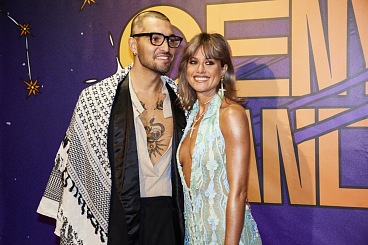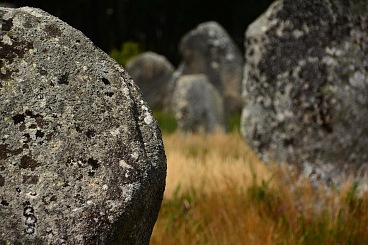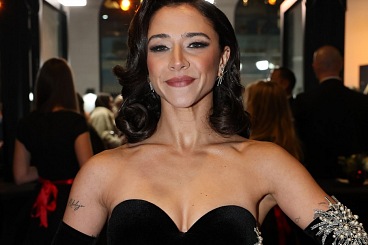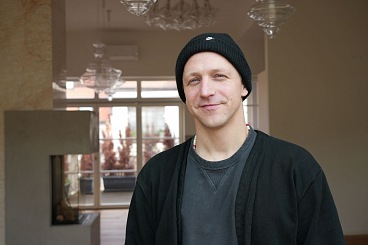Fast Confession - presidential candidate Jiří Drahoš: I am proud to be Czech
Jiří Drahoš, a native of Jablunkov, professor of chemical engineering and long-time president of the Czech Academy of Sciences, gave an interview to LP-Life.com in the Senator's office in Lesser Town. He received us very warmly with a kind smile on his face, with the grace of a quiet gentleman as well as humility. He confessed his love not only for the Czech Republic, but also for music, which has accompanied him from his youth to the present day. He also expressed his active interest in the future generations of our nation. He would like to see a debt-free future and better education for them.
You come from the Jablunkov area, where you grew up as a child. Your father was a teacher and your mother was the head children's nurse at the local nursery. What was your childhood like and how did you experience it in this area? And do you ever go back there?
I had a wonderful childhood, probably like most children, although it was a childhood in the 1950s, a time that was not very optimistic. But as a kid, you don't really notice it that much. I still have a brother, we mostly focused on the family around us, my mom, my dad, my uncles, my relatives. So I had a very nice childhood, despite the fact that from today's point of view we spent most of our lives in sweatpants and outside - running, playing sports, there were no computers, no TV, just radio. Childhood was fine. I come back to Jablunkov, but not as often as I used to. My parents are no longer alive, but my brother and his wife still live there, and we meet my nephew and nieces there. So we like to go to Jablunkov, but now in the time of the COVID the chances to meet were unfortunately poor. Actually, recently we went there again after more than a year.
Do you have a memorable childhood story to tell us?
I think there are many childhood stories to tell. I might mention one that is not at all happy, but I have it firmly lodged in my memory. When I was in the fifth grade of elementary school, my cousin, who was some ten or twelve years older than me, offered to take me on his scooter to the elementary art school because I would otherwise miss my piano lesson. But at one bend we collided with a bus. In retrospect, I think it's a good thing I survived it at all, but I ended up with my leg badly broken, and I still remember the scooter flipping over with us. I was sitting there on the road and couldn't get up. I tried to get up, but I sat down again. I don't know why at that moment I remembered the book Hero Nik by Eduard Štorch and the sentence where the hero says: "And his leg was crushed." I believe nearly everyone loved Eduard Štorch with his Mammoth Hunters and other books in their childhood. This is a memory that has never been erased from my mind. I don't have any trauma from it, but if you wanted to hear something from my childhood, that was a memorable moment for me. It's not very optimistic, but it's still somewhere in my head.
** byt/top**
You were raised to love music from a young age, and it still holds a very important position in your life. What instrument do you play? And do you go to concerts?
I don't know if you can still call it playing. Like the vast majority of children at that time, I took music lessons at an elementary art school in my free time. My parents put me in piano, and my younger brother took violin. I didn't like the piano that much, practicing etudes and things like that, who would enjoy that. My brother wasn't really into the violin either, but we both graduated eventually. He played the violin, I added the trumpet to the piano. Actually, I graduated the school on the wind instrument, the trumpet. My brother, besides violin, was very much into the guitar. I had to give up trumpet later because of gum problems, so I was left with just the piano. It's quite handy because I've been singing in a chamber choir for forty-eight years. When I need to learn some of the more difficult vocal parts that aren't easy to guess from the sheet music, I sit down at the piano at home. I have an electronic Yamaha, and I play everything I need on that. But I don't pay much attention to the piano, no, I couldn't play anything all that great anymore.
You used to have a band with your brother and friends. Which Czech bands inspired you in your youth, and which of their songs did you play?
As I said, my brother gradually converted to guitar, and we had an older radio at home. My brother got a pickup for his Spanish guitar, and we plugged it into the radio and felt like we have top-class electrification. So, with just the two of us, piano and guitar combined, we were slamming the big-beat hits of the time, such as the Matadors. We also played a lot of Olympik songs, we still have those little sheet music booklets that came out back then. I got to know Petr Janda much later, a few years ago actually. He lives in Propast near Stříbrná Skalice, and once a year in the summer my wife and I go there to see the band Souseďanka ("The Neighbor Band") perform. This is a grouping that has nothing in common with Olympik, except for Petr Janda himself, but, among others, they also sing Olympik songs. There I always enjoy singing with them, for example the one, "Nad Vltavou je cosi, plouží se to v rákosí, k mé hrůze je to cosi, dědečkův duch."("There is something above the Vltava River, it is crawling in the reeds, to my horror it is something, my grandfather's ghost.") But also other songs I know from the sixties. Of course, I had other favourite bands, like Flamengo, whose 1972‘s Kuře v hodinkách ("Chicken in the Watch") was an absolutely iconic LP. And I might also mention that not only did I like Czech music, but in college I also fell for blues rock in the style of the Woodstock festival. In general, I consider 1969 to be something incredible, because on the one hand, the first astronauts landed on the moon, I think on July 21, and then in August there was the Woodstock festival, which I still consider, and not only me, to be something unmatched. So Jimi Hendrix, Janis Joplin, Ten Years After, Santana, that's also the music of my heart.
You mentioned that you also love singing in a choir. Which composers in the choir singing repertoire do you like the most and why?
For forty-eight years I have been singing in the choir Canticorum iubilo, which has existed for 51 years. Last year we had planned to organize a concert for the 50th anniversary of the choir, but unfortunately, the COVID did not allow us to do so. So I hope that this autumn we will finally organize the anniversary concert. In those almost 50 years, one gets to sing all sorts of things in the choir, including many composers such as Dvořák and Bach. But perhaps I’d go with the fact that we will be singing works by three composers in particular, one of whom is Georg Friedrich Händel. There are several coronation anthems by him - one of them, by the way, Zadok, the Priest', is a very well-known tune that is sung every time the King or Queen of England is crowned. We have also sung a number of oratorios by Händel in the past, including Messiah and Joshua. And it is the oratorio Joshua, that has the popular chorus "See, the conquering hero comes", which we have – with the Latin version of the lyric, "I celebrate in song"– adopted as our choir's name and signature tune, in it. So we actually sing this song the most often. At the anniversary concert we will also sing our two beloved composers from the last century, namely Bohuslav Martinů and Peter Eben. Petr Eben we, as a choir, knew personally, he used to come to our rehearsals and we used to premiere some of his compositions back in former Czechoslovakia. So Martinů, Eben and Handel will be the main part of our anniversary concert.
You have graduated the University of Chemical Technology in Prague majoring in physical chemistry, how did you get into this field and when did you become interested in it?
Life consists of occasional coincidences, and I, after coming to VŠCHT, started working as a research assistant in the mathematics department in my first year. Lest anyone think I was some kind of mathematical genius, I was straightening the library there, organizing index cards and so on. But I didn't enjoy that so much. Then when I got an offer from the physical chemistry department that I could be a research assistant there, I went for it. It was then quite logical that when we were deciding on a specialization after three years — there was no bachelor's and master's degree then, just five years of engineering — then, since I had already dabbled in physical chemistry a little bit and the "physchem" was a very prestigious specialization, I chose physical chemistry. However, throughout my scientific life I did not "earn my daily bread" with physical chemistry, but mainly chemical engineering.
You have worked at the Institute of Chemical Processes of the Academy of Sciences of the Czech Republic since 1973, successively as a researcher, then as a senior researcher and deputy director, and in 1996-2003 you were even the head of the Institute. How does one manage chemical processes from the position of "senior researcher" or "director"? What were you responsible for?
I see you have done your homework on me. That's right. I was never in the Communist Party, so until the revolution, I was sort of "banned," as they say, from any kind of leadership position. I couldn't even lead a small team, but after the Velvet Revolution the managerial world opened up for me. I was first appointed deputy director and then elected director of the Institute. You know, it's quite interesting to be a director in your own institute, because you have a lot of friends and people you grew up with professionally there, and now you suddenly have to be their boss. I don't think it's so much about managing chemical processes, because the institute consists of many scientific departments, often headed by renowned personalities. It would therefore be silly for the director to meddle into the details of research of any particular group or department, but of course, he has to see that the direction of the institute, or, in my case, "chemical processes", runs as it should. Of course, the director also has to make sure that the institute produces quality results because in the CAS, all of the institutes get evaluated every 5 years by an international board and receive part of their funding accordingly. The better ones get more, the worse ones less. So that is one of the main concerns of the director. Then I also always said to myself, "remember, when you go up, treat people the same way you expect them to treat you when you go down later". I don't know if I've always followed that, because obviously, I must've stepped on some toes sometimes, friends or not. The director just has to make a decision, and sometimes it hits his friends as well. But I had that saying in my head and I tried to follow it. How it turned out is for others to judge.
Which human body chemistry process is the closest to your heart?
That's a difficult question. I would perhaps mention oxytocin, adrenaline and dopamine, given what I said in your short questionnaire. I mean, especially their production, because they're hormones that are related to love. It is said that love resides in the heart and comes from the heart and out of the heart, but that is not true. We all know that love resides in the brain. And it is these hormones, adrenaline, oxytocine and dopamine, and of course, other chemical reactions that take place there, that are the cornerstone of love. So I guess these processes.
How do you feel about increasing the national debt for future generations, given that you have grandchildren and are a loving grandfather? And do you see any entity on the current political scene that offers a suitable solution? There's an election coming up...
Precisely because the elections are coming up, I (and not only I) am watching the pace of the Czech Republic's debt growth with concern. After all, we are among the "top" European countries in that regard. So I have to say I don’t like this. First of all, with regard to the elections, it is very cheap, although perhaps effective towards the voters, to keep handing out promises and money and increasing the national debt. On the other hand, yes, we are creating a debt that our children and, in particular, our grandchildren will one day have to pay. I have a seven and an 11-year-old grandson and I sometimes wonder what they are actually growing into and what will happen to them in the future. Well, as for the solution... I have to say, for example, that specifically in the Senate, where I am a member of the Mayors and Independents deputies' club as an independent senator, we try to support those laws that do not further increase the national debt, and I think that should be the agenda of every government. But let me go back to the beginning: we are on the brink of an election and, unfortunately, we see a raging populism in some parties.
In 2012, you received the First Grade Medal of Merit for the meritorious services to the state in the field of science from Václav Klaus. From a scientist's point of view, how do you view the activities of the Václav Klaus Institute and his person today regarding his Eurosceptical stance and denial of climate change?
As a senator, I receive the Václav Klaus Institute's newsletter in my office every month, and I have to say that I always at least skim through it. I occasionally read some of the articles in it, and it gives me the strong impression that the staff of the Václav Klaus Institute, including the people who publish there, as well Václav Klaus himself, are quite stuck in the past regarding certain things. I could pay Václav Klaus a compliment in the sense that, for example, his opinion on the European Union is completely consistent. Although I do not agree with him on this at all, unlike the current President, who has repeatedly said, 'Only a fool does not change his mind', and behaves accordingly, Václav Klaus is truly consistent in his views. However, when I hear him, or when I read some of the articles in the bulletin, for example on the climate, where the authors say how current situations, such as the floods in Germany or the tornadoes in southern Moravia, are just being used to fool people, I have to completely dismiss these views. We are now sitting here in the Wallenstein Palace in the Lesser Town, and they are saying that all periods have already taken their turns in the geological spheres here. There have been seas, glaciers, tundra, there have been forests, and it keeps changing. And I wonder, so what? Does that mean we're supposed to ignore that since the industrial revolution, humanity has been emitting more and more pollutants and greenhouse gases? I'm no climate fanatic, in the sense that I’d be immediately accepting every measure or every opinion that comes out of the European Union, myself. But I do try to think about things or consult with people who understand them. Yet the stubbornness of climate sceptics, like the people from the Václav Klaus Institute, is deeply striking to me. That is not a scientific approach. The scientific approach is to discuss both sides of the issue, both points of view. Again, I am leaving aside the bureaucratic nature of the EU or some of their ideas, such as how we will achieve a break-even carbon balance by this year and that year. I do not know whether that is entirely realistic, but what I do know is that we should try to limit the emission of greenhouse gases, because they simply accumulate in the atmosphere and it is not good for the climate. The rising average temperatures are proof of that.
You are very supportive of the education of the next generation, and you are in favour of more modern forms of teaching and assessment, not only for pupils and students but also for teachers. A few days ago, you were quite critical towards a House meeting dropping the Teaching Staff Act, which was supposed to promote decent conditions for teachers and quality education in our country, on Facebook. Could you tell us more about this?
I will try to be brief: some time ago, in the spring of this year, the House of Commons approved an amendment to the Teaching Staff Act. There are two most important things: firstly, linking teachers' salaries to the average wage in the Czech Republic. This is something that I definitely agree with, and it's not just me. The second part, the controversial part for some people, was that the amendment allows, in Section 9a, for a principal to hire a person who is not a graduate of the Faculty of Education at his or her discretion. However, that person would have to complete certain disciplines such as pedagogy, psychology, teaching methodology and so on within three years. And the principal can let him teach because he knows that he teaches well, even though he hasn't graduated from the Faculty of Education. The amendment passed smoothly through the Chamber of Deputies at the time, and we in the Senate found out (as was pointed out by the sponsor himself and by the Ministry of Education as well) that there was a certain technical deficiency in the matter of linking teachers' salaries to the average salary, which the Ministry of Education would have to solve in a rather complicated way. So we agreed and adopted an amendment, a purely technical one, which had nothing to do with the core issue. We returned the bill to the House, thinking that the House would pass it without any problems. In the meantime, however, a "resistance" was formed by some people from the teacher's colleges, including the former Minister of Education, and they exerted enormous pressure against the passage of the amendment, saying that Section 9a was a complete degradation of the teaching profession, that it was the road to hell for the whole education system. So as an engineer with a degree from the University of Technology, if I wanted to teach in primary schools, I would automatically be a second-class teacher. This campaign in the Chamber of Deputies was going on very intensively and the people behind it had a dilemma: if they let this amendment, this "Senate return", be voted on, they would either have to vote in favour and thus also support the relevant Section 9a, or they would vote against, which would mean that they were also against linking teachers' salaries to the average wage. These were mostly MPs from the governing coalition who could not afford to appear to be against increasing teachers' salaries. So their tactic was to put the amendment consistently at the very last place in the agenda among those so-called "Senate returns", that is, among the bills that the Senate returns there. And thus not allowing it to get on the House agenda. I consider that to be great cowardice, because there was nothing else to do but vote. If it doesn’t go through voting, I'm not going to die on that hill, figuratively speaking, but I find it utterly undignified that parties that on the one hand shout about how they support teachers, their funding and their salaries, have, on the other hand, played a very ugly game in the House from my point of view.
You like to spend your free time with your family, ideally at the cottage, where you like to tend to your garden. Have you, perhaps, mastered also the royal discipline: pruning fruit trees?
I was already quite proficient at pruning back when I was a student and I helped my dad prune fruit trees in my parents' garden in Jablunkov, because we had nothing but fruit-bearing trees there. When my wife and I bought a cottage, the property had nothing but a carcass work, which we gradually finished, and a row of apple trees, because the former owner felt that the apple was the one and most important fruit. Then, when the apple trees were bearing, we often found ourselves in a situation where everyone around us had a lot of apples, and no one knew what to do with them. Eventually, we gradually cut down the apple trees and now there are no fruit trees at all. So at the moment it's more about pruning and trimming conifers and shrubs, that sort of routine maintenance before and after winter. But I would venture to say that I could still somehow manage that, as you say, royal horticultural discipline of pruning fruit trees. I'd remind myself of a few principles, and you can find almost everything on the internet nowadays. But I really used to prune the trees in our garden for several years.




















